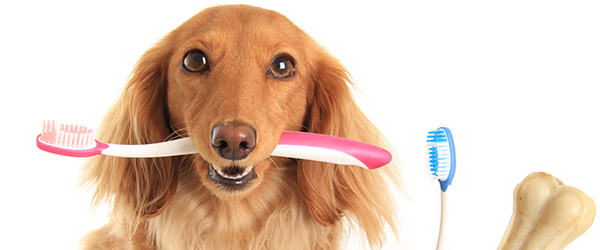
Dental health issues are one of the most commonly diagnosed problems in pets, so ensuring effective dental care is vital. Whether you have a dog, cat, or both, your pet’s teeth will require regular attention to prevent plaque building up and causing a whole host of problems later on in life.
You should never underestimate the seriousness of dental plaque. This film of bacteria develops on teeth and will harden quickly unless it’s brushed away in time. Left untreated, it can mineralise, turn to tartar and calculus, and cause a range of dental issues – from gum inflammation to tooth loss.
However, that’s just the start. Bacterial infections don’t stay confined in just one area of the body – if they’re left untreated, they can ‘seed’ to other parts of the body, meaning that your pet’s joints, intestinal tract, kidneys and heart could also be at risk.
How do I spot the signs and symptoms of dental disease?
While it would be great to know what your purry pal or canine companion are thinking, they can’t exactly tell you when there’s a problem, so it’s up to you to get them regularly checked. Animals are experts at hiding pain so, without knowing the symptoms to look out for, you could potentially miss a serious underlying issue.
Listed below are some of the main symptoms you should be looking out for:
| Dogs | Cats |
| Bad breath | Bad breath |
| Red, swollen or bleeding gums | Red, swollen or bleeding gums |
| Visible tartar on teeth | Visible tartar on teeth |
| Bleeding gums after brushing | Bleeding gums after brushing |
| Dribbling | Dribbling |
| Loss of appetite | Loss of appetite |
| Chewing on one side of the mouth | Aversion to hot/cold foods |
| Leaving broken crumbs after eating | Leaving a mess after eating |
| Swallowing food whole | Swallowing food whole |
| Taking dry food and eating it away from the bowl | Vomiting up whole pieces of (dry) food |
| Loose teeth | Loose teeth |
| Poor grooming | |
| Acting less playful | |

How do I look after my pet’s teeth at home?
Providing your pet with a regular dental routine at home can make a real difference to their long-term oral health. This is fairly easy to do as well, since there are plenty of preventative products available on the market capable of reducing the amount of dental work your pet will need as they get older.
Some of the key dental health care routines you should be implementing are tooth brushing, dental diets and treats, and dental toys and chews.
Tooth brushing
Brushing your pet’s teeth on a regular basis is by far the most effective way of removing plaque. In order to do this, use a soft, bristled dental toothbrush and a toothpaste you know your pet will enjoy the taste of, and clean their teeth once a day. After every 4 – 6 weeks, replace this toothbrush with a new one, and never ever use a toothpaste designed for humans.
At first, your pet may feel fairly disgruntled about getting their teeth brushed, but they will slowly get used to it. You’ll need to be patient with them though, as it could take many sessions for them to be comfortable with the idea of having their teeth brushed.
If you’re struggling, take a look at the video below to see the type of brushing technique you should be using:
Dental diets and treats
If your cat or dog is not being particularly cooperative when having their teeth cleaned, tooth friendly foods and products can be an alternative way of managing their dental health.
Many products currently available on the market are specially formulated to keep both your pet’s teeth and gums healthy. Dry dental health foods, for example, include hard food particles that clean your pet’s teeth as they chew, which help prevent plaque build-up.
Dental toys and chews
If you own a dog, you will know all too well how much they enjoy chewing on toys. So, wouldn’t it be great if you could get a toy which had the added benefit of protecting their teeth? Well, you can.
Dental toys, chews and sticks come available in a wide range of sizes and flavours. Individual chews may tend to look oversized, but don’t let that put you off – this is a deliberate tactic used to encourage your pet to chew on them, rather than swallow them whole.
However, if you’re confused or worried about which toy or chew to get, consult your vet and they will be able to help you identify a suitable solution.
How Vale Vets can help
For any advice on how to effectively look after your pet’s teeth at home, or if you have any questions regarding your pet’s dental health, our friendly team at Vale Vets are only a phone call away.
Simply get in touch by calling us on 0208 679 6969, or book in an appointment with us quickly and easily online.